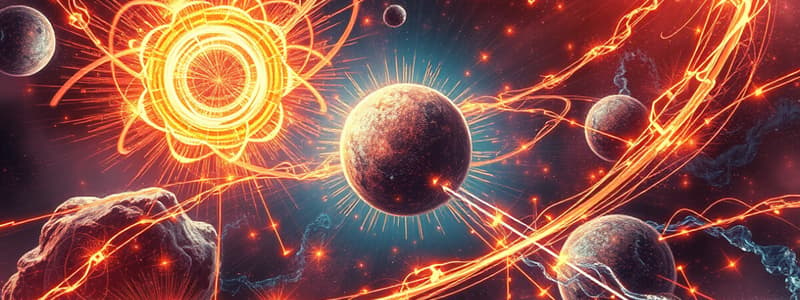Podcast
Questions and Answers
What is the fundamental principle behind electromagnetic induction?
What is the fundamental principle behind electromagnetic induction?
- Movement of electric charges
- Curvature of spacetime due to mass
- Generation of electric current by changing magnetic fields (correct)
- Constant speed of light in a vacuum
Which statement best describes the uncertainty principle in quantum mechanics?
Which statement best describes the uncertainty principle in quantum mechanics?
- Position and momentum can be measured simultaneously with high precision.
- Both wave-like and particle-like behaviors can be observed in particles.
- Relative motion of objects affects the measurement of their properties.
- It is impossible to know both the position and momentum of a particle with perfect accuracy. (correct)
In special relativity, which of the following statements is true?
In special relativity, which of the following statements is true?
- Time and space are relative, depending on the observer's velocity. (correct)
- Light can travel faster than any other object in a vacuum.
- Gravity can be ignored when considering the speed of light.
- Time and space are absolute and independent of observers.
What does general relativity explain about gravity?
What does general relativity explain about gravity?
How can understanding physics principles benefit technology and engineering?
How can understanding physics principles benefit technology and engineering?
What is the strongest fundamental force that binds protons and neutrons in an atomic nucleus?
What is the strongest fundamental force that binds protons and neutrons in an atomic nucleus?
Which of the following describes Newton's Second Law of Motion?
Which of the following describes Newton's Second Law of Motion?
What is the formula for calculating kinetic energy?
What is the formula for calculating kinetic energy?
Which of the following statements about waves is true?
Which of the following statements about waves is true?
What does the First Law of Thermodynamics state?
What does the First Law of Thermodynamics state?
In the context of energy, what does gravitational potential energy depend on?
In the context of energy, what does gravitational potential energy depend on?
Which equation represents Ohm's Law?
Which equation represents Ohm's Law?
What is indicated by the Second Law of Thermodynamics regarding entropy?
What is indicated by the Second Law of Thermodynamics regarding entropy?
Flashcards are hidden until you start studying
Study Notes
Key Concepts in Physics
-
Definition: Physics is the branch of science concerned with the nature and properties of matter and energy.
-
Fundamental Forces:
- Gravitational Force: Attraction between masses; governs planetary motion.
- Electromagnetic Force: Interaction between charged particles; responsible for electricity and magnetism.
- Weak Nuclear Force: Responsible for radioactive decay; plays a role in nuclear reactions.
- Strong Nuclear Force: Binds protons and neutrons in the nucleus; strongest force.
-
Laws of Motion (Newton's Laws):
- First Law (Inertia): An object at rest stays at rest, and an object in motion stays in motion unless acted upon by a force.
- Second Law (F=ma): The force acting on an object is equal to the mass of the object times its acceleration.
- Third Law (Action-Reaction): For every action, there is an equal and opposite reaction.
-
Energy:
- Kinetic Energy: Energy of an object in motion; calculated as KE = 1/2 mv².
- Potential Energy: Stored energy due to position; gravitational potential energy is PE = mgh.
- Conservation of Energy: Energy cannot be created or destroyed, only transformed from one form to another.
-
Thermodynamics:
- First Law: Energy conservation; total energy of a closed system is constant.
- Second Law: Entropy of an isolated system always increases; heat naturally flows from hot to cold.
- Third Law: As temperature approaches absolute zero, the entropy of a perfect crystal approaches zero.
-
Waves and Optics:
- Wave Properties: Wavelength, frequency, amplitude, speed.
- Types of Waves:
- Mechanical Waves: Require a medium (e.g., sound waves).
- Electromagnetic Waves: Do not require a medium (e.g., light waves).
- Reflection and Refraction: Changes in direction of waves when they encounter different media.
-
Electricity and Magnetism:
- Ohm's Law: V = IR (Voltage = Current × Resistance).
- Magnetic Fields: Created by moving charges; influence the motion of other charges.
- Electromagnetic Induction: Generation of electric current by changing magnetic fields.
-
Quantum Mechanics:
- Wave-Particle Duality: Particles exhibit both wave-like and particle-like properties.
- Uncertainty Principle: It is impossible to simultaneously know both the position and momentum of a particle with perfect accuracy.
-
Relativity:
- Special Relativity: Time and space are relative; the speed of light is constant in a vacuum.
- General Relativity: Gravity is the curvature of spacetime caused by mass.
-
Applications:
- Physics principles are foundational for technology, engineering, medicine, and environmental science.
Study Tips
- Understand concepts rather than memorizing; focus on applications.
- Solve problems related to real-life scenarios to enhance comprehension.
- Use diagrams to visualize complex concepts, especially in mechanics and waves.
Definition
- Physics examines the fundamental nature and characteristics of matter and energy.
Fundamental Forces
- Gravitational Force: Attracts masses; essential for governing the motion of celestial bodies.
- Electromagnetic Force: Acts between charged particles; responsible for phenomena such as electricity and magnetism.
- Weak Nuclear Force: Facilitates radioactive decay; crucial in nuclear reactions.
- Strong Nuclear Force: The strongest force, it holds protons and neutrons together in atomic nuclei.
Laws of Motion (Newton's Laws)
- First Law (Inertia): Objects maintain their state of motion unless acted upon by an external force.
- Second Law (F=ma): The force exerted on an object equals its mass multiplied by its acceleration.
- Third Law (Action-Reaction): Every action has an equal and opposite reaction.
Energy
- Kinetic Energy: The energy of moving objects, calculated using KE = 1/2 mv².
- Potential Energy: Stored energy based on position, with gravitational potential energy expressed as PE = mgh.
- Conservation of Energy: Energy is neither created nor destroyed, only transformed among different forms.
Thermodynamics
- First Law: Emphasizes energy conservation; the total energy of a closed system remains constant.
- Second Law: States that the entropy of an isolated system will always increase, with heat flowing from hot to cold spontaneously.
- Third Law: Entropy of a perfect crystal approaches zero as temperature nears absolute zero.
Waves and Optics
- Wave Properties: Key characteristics include wavelength, frequency, amplitude, and speed.
- Types of Waves:
- Mechanical Waves: Require a medium to propagate (e.g., sound waves).
- Electromagnetic Waves: Can travel through a vacuum (e.g., light waves).
- Reflection and Refraction: Waves change direction upon encountering different media.
Electricity and Magnetism
- Ohm's Law: Describes the relationship between voltage (V), current (I), and resistance (R) in a circuit: V = IR.
- Magnetic Fields: Produced by moving charges, affecting the motion of other charges.
- Electromagnetic Induction: The process of generating electric current through changing magnetic fields.
Quantum Mechanics
- Wave-Particle Duality: All particles demonstrate both wave-like and particle-like characteristics.
- Uncertainty Principle: It is impossible to accurately know both the position and momentum of a particle simultaneously.
Relativity
- Special Relativity: Proposes that the laws of physics are the same for all non-accelerating observers, with the speed of light as a constant.
- General Relativity: Describes gravity as the curvature of spacetime due to mass.
Applications
- Principles of physics are foundational in technology, engineering, medicine, and environmental science.
Study Tips
- Focus on understanding core concepts and their practical applications rather than rote memorization.
- Engage in problem-solving related to real-world scenarios to improve comprehension.
- Utilize diagrams to represent complex topics like mechanics and wave behavior visually.
Studying That Suits You
Use AI to generate personalized quizzes and flashcards to suit your learning preferences.




